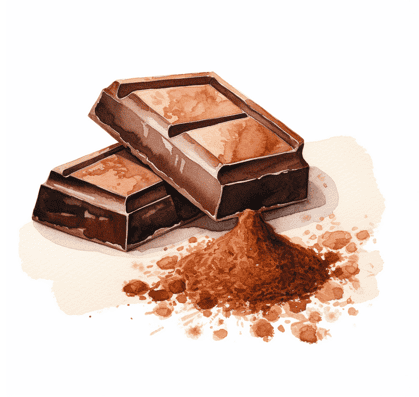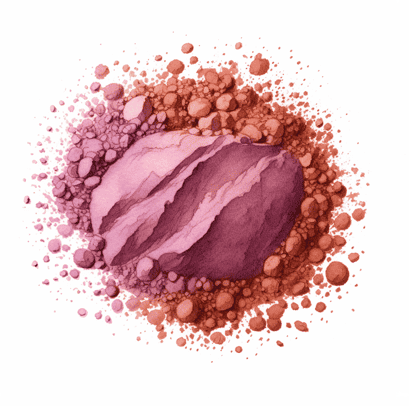
Navigating the world of cacao vs cocoa can feel like a maze, especially when you’re trying to boost both your health and beauty. Sometimes, the differences between these two can blur, making it tough to choose the right option for your lifestyle—let’s clear up that confusion.
Hi, I’m Hazel
I gave up on skincare after years of issues with acne and sensitive skin.
But after going plant-based, my skin cleared up and even started to glow. Now I help women reveal their natural beauty with simple, delicious plant-based food.
I also used to be a nurse, and love nerding out on nutritional science (high-quality science, that is).

As usual, this post is based on the strongest nutritional evidence I could find with a focus on the simplest, most delicious foods
…because who has time to waste on anything less?
The quick version:
Cacao and cocoa differ primarily in processing and nutrient content, with cacao being less processed and retaining higher levels of antioxidants like flavanols, which offer cardiovascular and skin health benefits. Cocoa, especially when not Dutched, provides similar benefits but at reduced levels due to its processing. Both can enhance beauty routines, offering skin hydration and elasticity improvements.
The Core Differences
Understanding the origins and the way these beans are processed can help you make informed choices that align with your health and beauty goals.

Origin and Processing
Cacao comes straight from the Theobroma cacao tree, cherished for its minimal processing which preserves the integrity and nutritional power of the cacao seeds and cacao pods.
These raw cacao beans are often crushed into cacao nibs or ground into raw cacao powder, keeping their nutritional value as close to nature as possible.
In contrast, Cocoa undergoes a roasting process at much higher temperatures, which significantly alters the nutritional content of the cocoa beans. This process gives rise to various cocoa products like dutch-processed cocoa powder and natural cocoa powder, widely used in baking and beverages but stripped of certain natural benefits.
Nutritional Content
Cacao not only delights the palate of a chocolate lover with its bitter flavour but also offers remarkable health benefits. Rich in antioxidants and beneficial nutrients, products labeled as organic cacao beans or raw cacao powder are becoming a staple for those looking to maintain a radiant complexion and robust health.
Cocoa, commonly found in sweeter, more processed forms like chocolate bars and chocolate cakes, might tempt with comfort but often comes with added sugars and lower nutritional benefits. Though enjoyable, regular cocoa powder and cocoa solids in these products are less potent compared to their unprocessed counterparts.
Beauty Benefits: Radiant Skin and Youthful Appearance
Explore how cacao and cocoa can transform your beauty regimen, enhancing skin health and offering anti-aging benefits.

Achieving Glowing Skin
Regular consumption of Cocoa has proven effects on skin conditions. Adding 2.5 teaspoons of cocoa powder to your drink can increase blood flow to the skin within 2 hours, enhancing oxygen saturation and giving your skin a fresh, vibrant glow (1).
Continuous intake over 6 to 12 weeks can significantly reduce redness from UV exposure by up to 25%, thanks to the protective properties of flavanols (1).
Raw chocolate products, which include unprocessed forms like chocolate liquor, maintain high levels of these beneficial compounds.
Smoothing Wrinkles and Improving Skin Texture
Cocoa excels in improving skin thickness, density, and hydration, smoothing out roughness and scaling. Consuming Cocoa daily for about 5.5 months leads to noticeable reductions in wrinkle depth and enhancements in skin elasticity (2).
Note: While there is less research on cacao, there shouldn’t be significant differences in the beauty benefits of cacao are probably very similar. In fact the outcomes may even be greater due to its greater level of antioxidants (3).
Health Benefits: Enhanced Well-Being and Vitality
Cacao and cocoa are not just treats but potent health enhancers. While more studies have been done on cocoa, the richer nutrient profile of cacao suggests it might provide even greater benefits.
Boosting Heart Vitality and Reducing Stress
The flavanol antioxidants in cacao, specifically flavan-3-ol, help maintain cardiovascular health by improving blood flow and reducing inflammation (4).
Note that these benefits are best realised when cacao is not consumed with dairy (5).
Cocoa, particularly dark chocolate nut not milk chocolate and white chocolate, is effective in reducing oxidative stress, crucial for maintaining heart health and overall vitality (6).
Enhancing Mental Sharpness and Gut Health
Cocoa boosts global cognitive function during stressful periods by increasing levels of Brain-Derived Neurotrophic Factor (BDNF) (7).
The chocolate industry is increasingly focusing on the health impacts of their products, promoting cacao’s natural benefits.
Culinary and Beauty Uses
Exploring the unique flavours and beauty applications of cacao vs cocoa can open up new avenues for enhancing your diet and skincare routine.

In Recipes
Cacao is perfect for those who prefer a bitter taste.
It’s often used in its purest form of chocolate, like dark chocolate bars, where its robust flavours can shine. This makes it an excellent choice for health-forward baking and raw desserts that require a deep, rich chocolatey note without the extra sweetness.
Cocoa, with its softer and more versatile flavour profile, is a staple in comfort foods like hot chocolate and ice cream.
Its milder taste makes it easy to incorporate into a wide array of recipes, providing a chocolate flavour that appeals to everyone without overwhelming other ingredients.
In DIY Beauty Treatments
Turning to the beauty side, cacao butter and cocoa butter play starring roles in homemade skincare treatments.
Cacao butter, with its rich, nourishing properties, can be used to make moisturising creams and lip balms that leave your skin feeling soft and hydrated.
Meanwhile, cocoa butter is a key ingredient in many commercial and DIY beauty products, known for its ability to smooth scars and improve skin elasticity.
These natural butters not only enhance the shelf life of your beauty products but also boost their nutritional benefits, offering a touch of indulgence that your skin will love.
Making the Right Choice
Deciding between cacao vs cocoa hinges on your personal health objectives, taste preferences, and how each fits into your unique lifestyle.
Finding Your Flavour Match
If you’re seeking the maximum health advantages, cacao is your go-to due to its richer nutrient profile and higher antioxidant levels.
It’s perfect for those who enjoy the robust, bitter flavour of less processed chocolate, like dark chocolate bars. Cacao is often favored by those looking for a powerful health punch and a more authentic chocolate experience.
Cocoa, on the other hand, is more about versatility and mildness, making it ideal for everyday culinary uses.
It’s a key ingredient in comforting recipes like hot chocolate and ice cream, where its gentle flavour enhances without overpowering. If your goal is to please a variety of tastes, particularly in family or social settings, cocoa ensures everyone enjoys your creations.
Health-Centric Choices
For health-focused individuals, it’s important to note that cocoa, while beneficial, contains different levels of flavonoids depending on its processing.
The Dutched cocoa process, although it makes for a tastier cocoa, significantly reduces the flavonoid content.
Hence, if the health benefits associated with these compounds are a priority, sticking with regular, unprocessed cocoa or opting for cacao might be the better choice.
Beauty and Beyond
Incorporating cacao or cocoa into your beauty routine can also be a delightful addition. Both cacao butter and cocoa butter are excellent for DIY beauty treatments, enhancing skin hydration and elasticity. Choose based on your desired outcome, whether it’s for deeper moisturising effects or lighter, soothing applications.
Cacao vs Cocoa
Experimenting with both cacao vs cocoa can provide a balanced perspective, allowing you to enjoy the best of both worlds. Whether it’s adding cacao nibs to your morning smoothie for an antioxidant boost or using cocoa in your favorite baking recipe, each has its place in a health-conscious kitchen.
FAQ: Cacao vs Cocoa
Is 100% Cocoa the Same as 100% Cacao?
Understanding the terminology can be confusing, but it’s important to distinguish between “100% cocoa” and “100% cacao.” “100% cocoa” refers to a product made entirely from cocoa beans without additives but has undergone roasting and sometimes alkalising (as in Dutched cocoa).
In contrast, “100% cacao” typically means the product is made from unprocessed cacao beans, preserving more of the original nutrients and antioxidants. This distinction highlights the different levels of processing each undergoes, affecting their nutritional value and health benefits.
Can I Substitute Cacao for Cocoa?
Substituting cacao for cocoa and vice versa depends largely on your recipe and taste preferences. Cacao, being less processed, tends to have a more robust and bitter flavour than cocoa. It’s richer in nutrients, making it a healthier choice, though its strong flavour might not suit all recipes.
Cocoa, being milder, works well in sweeter, lighter dishes. When substituting, consider the desired flavour profile and health benefits of your dish, but generally, you can substitute them in equal measure for most recipes.
Is Cacao Just Dark Chocolate?
While cacao and dark chocolate are closely related, they are not the same. Cacao refers to the raw, unprocessed seeds of the Theobroma cacao tree and products made directly from them, such as cacao nibs or cacao powder.
Dark chocolate, however, is made by adding fat (like cocoa butter) and sugar to cacao, undergoing processing which can reduce its nutritional content. Thus, while all dark chocolates contain cacao, not all cacao products qualify as dark chocolate, especially those that are minimally processed to preserve more health benefits.
References
Most references below will link to the original peer-reviewed study itself. However, sometimes I will link to a video over at NutritionFacts.org instead, which is by far the single best resource of brutally transparent nutritional evidence you will ever see. Dr Greger tells a great story about the realities of the science and if I think you will benefit more from one of his videos, the link will take you there instead.
Happy nerding!
- Neukam K, Stahl W, Tronnier H, Sies H, Heinrich U. Consumption of flavanol-rich cocoa acutely increases microcirculation in human skin. Eur J Nutr. 2007;46(1):53-56. doi:10.1007/s00394-006-0627-6
- Yoon HS, Kim JR, Park GY, et al. Cocoa Flavanol Supplementation Influences Skin Conditions of Photo-Aged Women: A 24-Week Double-Blind, Randomized, Controlled Trial. J Nutr. 2016;146(1):46-50. doi:10.3945/jn.115.217711
- Carlsen MH, Halvorsen BL, Holte K, et al. The total antioxidant content of more than 3100 foods, beverages, spices, herbs and supplements used worldwide. Nutr J. 2010;9:3. Published 2010 Jan 22. doi:10.1186/1475-2891-9-3
- Miller KB, Hurst WJ, Payne MJ, et al. Impact of alkalization on the antioxidant and flavanol content of commercial cocoa powders. J Agric Food Chem. 2008;56(18):8527-8533. doi:10.1021/jf801670p
- Serafini M, Bugianesi R, Maiani G, Valtuena S, De Santis S, Crozier A. Plasma antioxidants from chocolate. Nature. 2003;424(6952):1013. doi:10.1038/4241013a
- Mehrabani S, Arab A, Mohammadi H, Amani R. The effect of cocoa consumption on markers of oxidative stress: A systematic review and meta-analysis of interventional studies. Complement Ther Med. 2020;48:102240. doi:10.1016/j.ctim.2019.102240
- Neshatdoust, S., Saunders, C., Castle, S. M., Vauzour, D., Williams, C., Butler, L., Lovegrove, J. A., & Spencer, J. P. (2016). High-flavonoid intake induces cognitive improvements linked to changes in serum brain-derived neurotrophic factor: Two randomised, controlled trials. Nutrition and healthy aging, 4(1), 81–93. https://doi.org/10.3233/NHA-1615